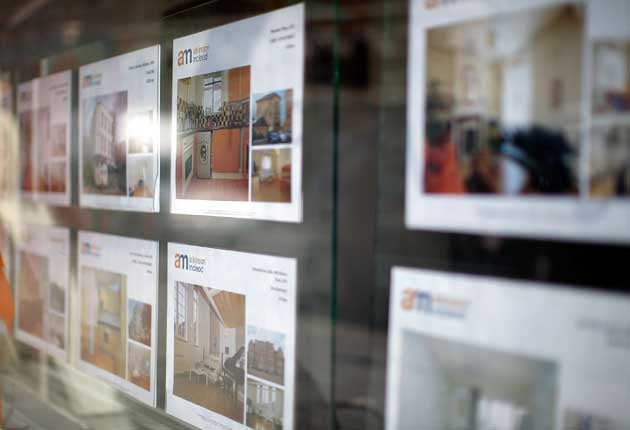Call for action over housing market crisis

Your support helps us to tell the story
From reproductive rights to climate change to Big Tech, The Independent is on the ground when the story is developing. Whether it's investigating the financials of Elon Musk's pro-Trump PAC or producing our latest documentary, 'The A Word', which shines a light on the American women fighting for reproductive rights, we know how important it is to parse out the facts from the messaging.
At such a critical moment in US history, we need reporters on the ground. Your donation allows us to keep sending journalists to speak to both sides of the story.
The Independent is trusted by Americans across the entire political spectrum. And unlike many other quality news outlets, we choose not to lock Americans out of our reporting and analysis with paywalls. We believe quality journalism should be available to everyone, paid for by those who can afford it.
Your support makes all the difference.The housing market is in crisis as home ownership tumbles and house prices soar, a study warned today.
Home ownership in England will slump to just 63.8% over the next decade, the National Housing Federation's forecast said, the lowest level since the mid-1980s.
Huge deposits, combined with high house prices and strict lending criteria, have sent home ownership into decline, the Federation said.
The Federation, which represents England's housing associations, warned the housing market will be plunged into an unprecedented crisis as it also forecast steep rises in the private rental sector and a house price boom.
The Federation blamed the bleak outlook on an under-supply of homes in the UK.
Federation chief executive David Orr said: "With home ownership in decline, rents rising rapidly and social housing waiting lists at a record high, it's time to face up to the fact that we have a totally dysfunctional housing market.
"Home ownership is increasingly becoming the preserve of the wealthy and, in parts of the country like London, the very wealthy.
"And for the millions locked out of the property market the options are becoming increasingly limited as demand sends rents rising sharply and social homes waiting lists remain at record levels."
In England, the proportion of people living in owner occupied homes will fall from a peak of 72.5% in 2001 to 63.8% in 2021, the Federation forecast.
In London, the majority of people living in the capital will rent by 2021 with the number of owner occupiers falling from 51.6% in 2010 to 44% by 2021, it added.
The North East will be the only English region to see any increase in owner occupier numbers over the next decade, rising marginally from 66.2% to 67.4%, the Federation predicted.
The average house price in England will meanwhile rise by 21.3% over the next five years from £214,647 in 2011 to £260,304 in 2016, according to Oxford Economics, who were commissioned to produce the forecasts.
The Federation warned the hundreds of thousands of people locked out of the housing market will see the options open to them become increasingly limited.
Average rents in the private sector are forecast to increase sharply by 19.8% over the next five years fuelled by high demand and a shortage of properties. Oxford Economics predicted that means rents would increase on average in England from £486 a month in 2011 to £582 a month in 2016, meaning tenants would be paying £1,152 more a year in total.
Around 4.5 million people are currently stuck on social housing waiting lists - but only those in the most desperate of circumstances have a realistic chance of being allocated a home.
The Federation said in 2010/11 105,000 homes were built in England - the lowest level since the 1920s.
More government investment in affordable housing would stimulate a wider, faster economic recovery and help fix our broken housing markets, according to the Federation.
Mr Orr continued: "At the heart of this crisis is a chronic shortage of new homes. Despite the overwhelming need to increase supply, house building has slumped to a 90-year low, plunging the country even deeper into the mire.
"Ministers need to make unused public land available to housing associations, local authorities must assess the level of housing need in their area, and housing has to be finally treated as a top political priority."
Housing Minister Grant Shapps said: "The trebling of house prices in the 10 years from 1997 has locked too many out of owning their own home.
"I want to see a period of house price stability so that more homes become affordable, but I am also determined that we pull out all the stops to give hard-working first-time buyers the help they need.
"That's why I've held summits with lenders to encourage them to do more to help people take their first step onto the housing ladder, and I've launched the FirstBuy scheme as a valuable alternative to the Bank of Mum and Dad for those struggling to get together that much-needed deposit.
"But we also need to get Britain building again. That's why I've announced plans to release thousands of acres of public land for housebuilding.
"Despite the need to tackle the deficit we inherited, this government is putting £4.5 billion towards an affordable homes programme which is set to exceed our original expectations and deliver up to 170,000 new homes over the next four years."
PA
Join our commenting forum
Join thought-provoking conversations, follow other Independent readers and see their replies
Comments